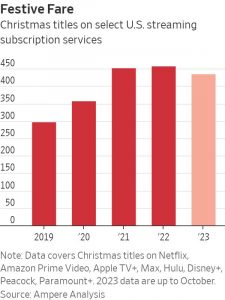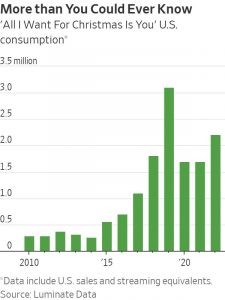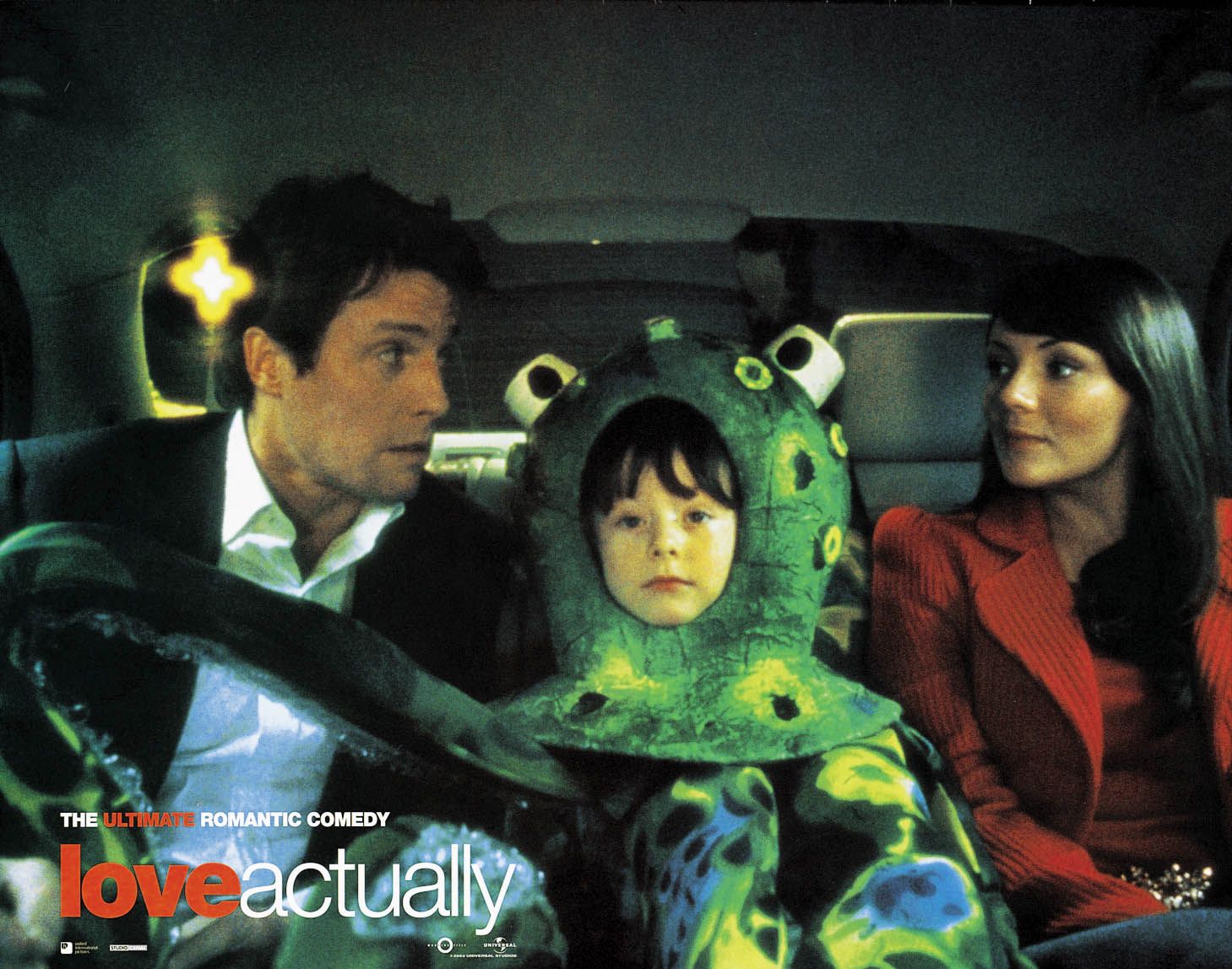One character has lost his wife, two get cheated on, another receives unwanted attention from the U.S. president, and still another has to put family obligation ahead of a romantic relationship.
We can’t get enough of this holiday laugh-and-cry fest: It is “Love Actually.”
Twenty years after its debut, the R-rated ode to love in all its gnarled forms is back in theaters across the country this weekend. Universal Pictures Home Entertainment is releasing a 4K Blu-ray version of the film that includes deleted scenes, cast interviews and behind-the-scenes stories.
TikTok, Reddit and Instagram swell each year with videos and threads critiquing the choices characters make in the name of love, re-creating Hugh Grant’s 10 Downing Street dance, and turning iconic lines into memes. In one such video, text that says “your dog looking at your camera roll” is laid over a video of Keira Knightley’s character saying “they’re all of me.”
The movie is, actually, an unstoppable juggernaut that year after year ranks among the studio’s top five holiday home rentals. Streaming services jockey to get a piece of it. Amazon and Netflix have already secured the rights to stream the film for parts of the next few years.
So what, actually, is it, about “Love Actually” that keeps viewers coming back year after year?
“It’s about love, but it’s not the sickeningly sweet Hallmark love—it’s real love,” said Nancy Veloz, who watches the movie any time it is on cable. Most holiday fare is formulaic, she said, while “Love Actually” feels more real.
The interlocking storylines range from a recently widowed dad helping his son impress his school crush, to a British prime minister who falls for a staff member, a writer and his housekeeper who find love despite a language barrier and a man who covets his best friend’s wife.
It appeared on fewer than 600 screens and grossed less than $7 million on its opening weekend in 2003, but it soon gained momentum. Since then, the film has earned a global cumulative gross of $248.1 million at the box office, according to Comscore, more than the $227.4 million brought in by “Elf,” which opened the same weekend starring Will Farrell.
Rey Baca, 31, in Los Angeles recently watched a musical staged version of “Love Actually,” featuring performers belting songs from the soundtrack as the film plays overhead. Tickets to the show, now in its fourth year, cost up to $139 each and the production wraps with a nearly naked performer singing “Christmas Is All Around” and snow falling.

The performance has a limited run between Thanksgiving and Christmas and is produced by immersive theater company For the Record with permission from Universal Theater Group. Stage performers, who this year include an “American Idol” finalist, mirror scenes from the film playing on shifting onstage panels.
The film is nostalgic for Baca, who used to watch it yearly with her mom and sister, and she likes seeing all the storylines come together. “The love is different for each scenario,” she said.
Writer and director Richard Curtis, of “Notting Hill” fame, said he feared the film would be a disaster when it opened. “The reason I’ve not done another film like that again is because we got away with it by the skin of our teeth and by using a lot of wonderful songs as glue.”
The soundtrack is dripping in heart-tugging songs from Joni Mitchell, Dido and Otis Redding and punctuated by uplifting hits from the Pointer Sisters and the Beach Boys. The film helped fuel the ascent of Mariah Carey’s now-ubiquitous “All I Want for Christmas Is You,” which was released nearly a decade before the movie.
It didn’t start out as a Christmas movie. Curtis had mapped out two stories in the movie—the young British man who travels to America to find love, and the new prime minister who falls for his secretary—as their own stand-alone films, but decided to reduce them to just their best parts.
He combined them with other characters, some semi-autobiographical, and set it all at Christmastime, aiming to explore a variety of types of love, for better or worse. “The heartbreaking ones were doomed from the start,” he said. Laura Linney’s character, for example, an American in London responsible for her disabled brother’s welfare, was based partly on Curtis’s own family. The character had to put sibling responsibility ahead of her own love.
 Curtis recently returned to the original script, and noticed that the sequence of what he wrote is far different from the story viewers watch each year. Editing the film was “like playing three-dimensional chess” to tell the many and varied stories in a compelling way.
Curtis recently returned to the original script, and noticed that the sequence of what he wrote is far different from the story viewers watch each year. Editing the film was “like playing three-dimensional chess” to tell the many and varied stories in a compelling way.
“After all these years I have no idea what’s going to happen next,” he said, adding that its surprises and reveals are part of what make it so rewatchable.
His gamble paid off. The movie is now a staple of many families’ pre-Christmas bingeing. Etsy is full of ornaments, shirts and candles featuring famous quotes like “I hate Uncle Jamie” — what one character’s young family members declare when he arrives at a family Christmas gathering but quickly walks back out the door to pursue his love interest.
Each year brings new thought pieces on elements of the film some viewers find problematic, such as a character who uses flashcards to declare his love for his best friend’s wife or jokes made about a female character’s weight.
“I wouldn’t call them regrets, but I think the world has and does change and I’m very very aware,” Curtis said of those criticisms.
The unconventional format helped inspire other holiday-themed films such as Gary Marshall’s “Valentine’s Day” and “New Year’s Eve,” though none have had “Love Actually’s” staying power.
Early on executives at NBCUniversal Global TV Distribution identified it as a film that would keep giving, both around Christmas and Valentine’s Day. As streaming platforms grew in popularity in the 2000s they explored deals with streamers in addition to TV networks.
NBCUniversal, which holds North American distribution rights to the film, cuts deals each year for it to appear on different platforms for specified amounts of time, often just a few months. Viewers have been able to find it at varying times over the past five years on Amazon Prime Video, Hulu, Netflix, Paramount+, Peacock, Tubi and Roku, in addition to several cable networks.
“Love Actually” debuted well before the business of making Christmas films exploded.
While some studios would make holiday movies for theatrical releases, it wasn’t always economical to do so. The gap or so-called window between theatrical releases and when films are available for at-home rentals, used to be months long, which meant that by the time Christmas movies were rentable, the holiday was out of mind.
“Christmas used to be an underserved part of the marketplace,” said Brad Krevoy, chief executive of Motion Picture Corporation of America, who is a prolific producer of holiday fare for streaming platforms and who helped build Hallmark’s Christmas collection. “The economics did not favor the Christmas movies so they were few and far between.”
Cable’s heyday started to change that, with networks learning that holiday movies made on relatively small budgets and released directly to TV audiences were a hit. That trend has continued into the streaming age.
Krevoy said he pestered Netflix co-founder Reed Hastings and Co-CEO Ted Sarandos for years to let him make an original Christmas film for the platform and got his shot with 2017’s “A Christmas Prince” about a reporter who goes undercover to learn about a royal and falls for him. Krevoy has made more than a dozen holiday films for Netflix since then including last year’s “Falling for Christmas,” starring Lindsay Lohan and this year’s “Best. Christmas. Ever!” starring Brandy.
His company makes an average of 12 to 20 new Christmas films a year, with budgets ranging from $2.5 million to $20 million or more. There are some things that always make them hit audiences just so: Every shot must have a Christmas tree or decorations and stories must have uplifting endings, he said. Those new films now sit alongside a smattering of Christmas classics like “Love Actually,” “Elf” and “A Christmas Story.”
There were nearly 300 Christmas films on major streaming services in 2019, and there are over 400 and counting this year, according to data provider Ampere Analysis. Krevoy fears the Christmas movie genre is now being corrupted by its own popularity with too many low-quality films made today. Curtis “zoomed in on the zeitgeist and delivered the most entertaining storytelling of his generation,” Krevoy said.
Greg Marcus, CEO of Marcus Theatres, said his theaters offer a holiday pass ticket that lets viewers see four movies for $20. The lineup includes “Love Actually,” “Elf” and “It’s a Wonderful Life.” “Love Actually” viewers span young people seeing it for the first time and old people who have been watching it for two decades.
“There’s so much bad stuff in the world and there is no shortage of films about problems and challenges. People want to laugh and at a certain level, want to be hopeful. This movie gives you hope that there’s love,” Marcus said.
Write to Sarah Krouse at sarah.krouse@wsj.com



